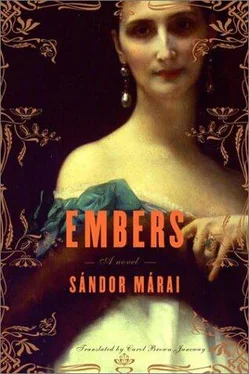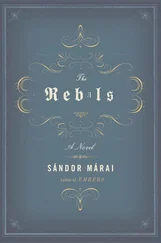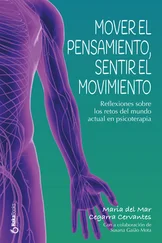“I went to the hunting lodge not far from the house-you know it well-and I did not see Krisztina for eight years. The first time I saw her again one morning was as a corpse, when Nini sent word that I could return to the house because she was dead. I knew that she was ill, and as far as I know she was taken care of by the best doctors, who came and stayed here in the castle for months and did everything to save her. As they put it, “We have done everything within the scope of modern medicine.’ Those are just words. They apparently did everything within their erratic knowledge and the limits of their vanity. Every evening for eight years, I was informed of what was going on in the castle, both before Krisztina was ill and then later, when she decided to become ill and die. I do believe such things can be decided-and now I am quite certain of it. But I couldn’t help Krisztina because there was an unpardonable secret between us of the kind that it is better not to force open prematurely, because there is no telling what still may be hidden underneath. There are worse things than suffering and death … it is worse to lose one’s self-respect. That was why I was so afraid of the secret between the three of us. Self-respect is the irreplaceable foundation of our humanity; wound it, and the hurt, the damage, is so scalding that not even death can ease the torture. Vanity, you say. Yes, vanity … and yet self-respect is what gives a person his or her intrinsic value.
That is why I so feared this secret, that is why people accept the compromises they do, even cheap and cowardly ones.
“Look around you and you will see nothing but partial solutions: this one leaves the woman he loves out of fear of a secret, that one stays and says nothing and waits unceasingly for an answer … I have seen such things. And I have experienced them, too. It is not cowardice, it is one’s will to life summoning its last line of defense. I went home, I waited until evening, then I moved to the hunting lodge and waited eight years for something, anything: a word, a message. But Krisztina did not come. In a carriage, the journey there from the castle takes two hours.
But to me, these two hours, these twelve miles, were a greater distance in time and space than the tropics to you. That is a given in me, that is how I was raised, that is how things unfolded. Had Krisztina sent a message-any message-her wishes would have been granted. Had she wanted me to fetch you back, I would have set out to search the world for you and bring you back. Had she wanted me to kill you, I would have gone to the ends of the world to find you and kill you. Had she wanted a divorce, I would have given her a divorce. But she wanted nothing.
Because she, too, had a strong personality, as a woman, and she, too, had been wounded by those she loved: by this one because he fled from love, not wishing to be consumed by a fateful liaison; by that one because he knew the truth, waited, and said nothing. Krisztina, too, had character, in a different sense of the word from the one we men use. In those years, you and I were not the only ones to whom things happened: they happened to her, too.
“Destiny brushed against me and fulfilled itself, and all three of us had to bear the brunt. For eight years, I did not see her. For eight years, she did not summon me. Just now, while I was waiting for you so that we could discuss what had to be discussed one day, since there is so little time left, I learned something from my nurse: I learned that Krisztina asked for me when she was on her deathbed. Not for you … And I do not say that with satisfaction-nor without it, either, kindly note.
She asked for me, and that is something, if not much … But she was already dead when I saw her again. Beautiful even in death. Still young, unmarred by solitude, not even illness had touched that special beauty or spoiled the reserve and quiet harmony of her face. But that is not your affair,” he says, suddenly haughty. “You were living out there in the world, Krisztina died. I was living in lonely affront, Krisztina died. She answered both of us in her way; because the dying always give the right and the final answer-sometimes I think they are the only ones who can do that. What else could she have said after eight years except by dying? Who could say more? She had answered all the questions you or I could have put to her, should she have wanted to speak to either of us. The dead give the final answer. She did not want to speak to us.
Sometimes I think that of the three of us, she was the one who was betrayed. Not I, whom she deceived with you; not you, who deceived me with her-deceit, what a word! There is a vocabulary that defines a human situation that is so soulless and mechanical, but when it’s allover, as it is for the two of us now, there is not much we can do with such a vocabulary. Deceit, infidelity, betrayal-mere words, when the person involved is dead and has already addressed their true meaning. Beyond words is the mute reality that Krisztina is dead-and we are still alive.
When I understood this, it was already too late. All that was left was the waiting and the thirst for revenge-and now that the waiting is over and the time for revenge is here, I am amazed to feel how hopeless it all is, and the pointlessness of anything we could learn or admit or fight out between us. I understand the reality. Time is a purgatory that has cleansed all fury from my memories. Now I sometimes see Krisztina again when I’m asleep-and also when I’m awake-walking through the garden with a big straw hat, slender, in a white dress, coming out of the greenhouse or talking to her horse. I see her, I saw her this afternoon while I was waiting for you and fell asleep for a moment. I saw her as I was dozing,” he says shamefaced, an old man. “I saw pictures from long, long ago. And this afternoon my mind grasped what my heart has known for a long time: infidelity, deceit, betrayal-I understood them, and what can I say? … We age slowly. First, our pleasure in life and other people declines, everything gradually becomes so real, we understand the significance of everything, everything repeats itself in a kind of troubling boredom. It’s the function of age. We know a glass is only a glass. A man, poor creature, is only a mortal, no matter what he does.
Then our bodies age: not all at once. First, it is the eyes, or the legs, or the heart. We age by installments. And then suddenly our spirits begin to age: the body may have grown old, but our souls still yearn and remember and search and celebrate and long for joy. And when the longing for joy disappears, all that are left are memories or vanity, and then, finally, we are truly old. One day we wake up and rub our eyes and do not know why we have woken. We know all too well what the day offers: spring or winter, the surface of life, the weather, the daily routine. Nothing surprising can ever happen again: not even the unexpected, the unusual, the dreadful can surprise us, because we know all the probabilities, we anticipate everything, there’s nothing we want anymore, either good or bad. That is old age. There’s still some spark inside us, a memory, a goal, someone we would like to see again, something we would like to say or learn, and we know the time will come, but then suddenly it is no longer as important to learn the truth and answer to it as we had assumed in all the decades of waiting. Gradually we understand the world and then we die. We understand phenomena and the motive forces of men and the sign language of the unconscious. People communicate their thoughts in sign language, have you noticed? As if they were discussing important matters in a foreign language like Chinese, which had to be translated into the language of reality. They have no self-knowledge. All they talk about is what they want, thereby exposing themselves unconsciously in all their hopelessness.
Читать дальше












